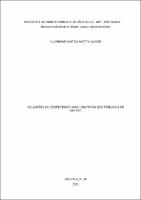Use este identificador para citar ou linkar para este item:
https://repositorio.idp.edu.br//handle/123456789/3374| Título: | Os limites da competência sancionatória dos tribunais de contas |
| Autor(es): | Motta Junior, Clarimar Santos |
| Orientador(es): | Pereira, Flávio Henrique Unes |
| Palavras-chave: | Tribunais de contas;Controle externo da administração pública;Competência sancionatória;Direitos e garantias fundamentais |
| Data de submissão: | 2020 |
| Citação: | MOTTA JUNIOR, Clarimar Santos. Os limites da competência sancionatória dos tribunais de contas. 2020. 167 f. Dissertação (Mestrado Profissional em Direito, Justiça e Desenvolvimento) Instituto Brasileiro de Ensino, Desenvolvimento e Pesquisa, Brasília, 2021. |
| Resumo: | Nos últimos anos, os Tribunais de Contas têm proferido uma série de julgamentos que têm
provocado grande repercussão na mídia e na sociedade, entoando o ideário do combate à
corrupção e ao mau uso do dinheiro público, aplicando as mais diversas sanções a agentes
públicos e privados. Nesse cenário, exige-se um estudo do limite da competência
sancionatória atribuída pela Constituição Federal aos Tribunais de Contas, a fim de fixar
uma interpretação do dispositivo constitucional que confere tal atribuição a estas Cortes,
em conformidade com os direitos e garantias fundamentais, sem deixar de lado outros
dispositivos constitucionais voltados para a definição da competência sancionatória do
Estado, do controle externo da Administração Pública, da autonomia e da separação dos
poderes da república. O método empregado neste estudo, dividido em três capítulos, é o
dedutivo, com o emprego de raciocínio jurídico interpretativo e aplicação de técnica de
análise de bibliografia, legislação e jurisprudência, que levou a conclusão de que o campo
de atuação sancionatório dos Tribunais de Contas é vasto, mas não é ilimitado. No campo
sancionatório estatal, a Constituição Federal impõe uma rigida separação de competências,
de modo que ao conferir a determinado órgão a competência para impor determinada
sanção, outorga-lhe o poder de agir, e ao mesmo tempo, exclui este mesmo poder a outros
órgãos, tendo, ainda, nos direitos e garantias fundamentais verdadeiras balizas e
referenciais para aplicação de qualquer tipo de sanção. Assim, a análise das leis orgânicas
dos 33 (trinta e três) Tribunais de Contas do Brasil revela que vários dispositivos, os quais
versam sobre as sanções a serem aplicadas a agentes públicos e privados, padecem de
inconstitucionalidade, razão pela qual se constatou a existência de diversos julgados destas
Cortes em desconformidade com o texto constitucional, exigindo, diante deste quadro de
violações e ilegalidades, a necessidade de se promover as ações judiciais cabíveis para
defesa dos direitos dos jurisdicionados diante de decisões proferidas pelos Tribunais de
Contas que violem a competência que lhes é atribuída pela Constituição Federal. |
| Abstract: | In recent years, the Courts of Accounts have issued a series of judgments that have had great repercussions in the media and in society, chanting the ideas of fighting corruption and the misuse of public money, applying the most diverse sanctions to public and private agents. In this scenario, a study of the limit of the sanctioning competence attributed by the Federal Constitution to the Courts of Accounts is required, in order to establish an interpretation of the constitutional provision that confers such attribution to these Courts, in accordance with fundamental rights and guarantees, without leaving on the other hand, other constitutional provisions aimed at defining the sanctioning competence of the State, the external control of the Public Administration, the autonomy and separation of the Powers of the Republic. The method used in this study, divided into three chapters, is the deductive one, with the use of interpretive legal reasoning and application of bibliography, legislation and jurisprudence analysis technique, which led to the conclusion that the field of sanctioning of the Courts of Accounts it is vast, but it is not unlimited. In the state sanctioning field, the Federal Constitution imposes a rigid separation of powers, so that by granting a specific body the power to impose a certain sanction, it grants the power to act, and at the same time, excludes this same power from other bodies, also having in the fundamental rights and guarantees true guidelines and references for the application of any type of sanction. Thus, the analysis of the organic laws of the 33 (thirty-three) Courts of Auditors in Brazil reveals that several provisions that deal with the sanctions to be applied to public and private agents suffer from unconstitutionality, which is why it was found that there are several judgments of these Courts in disagreement with the constitutional text, demanding, in view of this picture of violations and illegalities, the need to promote the appropriate legal actions to defend the rights of the jurisdicted in the face of decisions rendered by the Courts of Accounts that violate the competence attributed to them by the Federal Constitution |
| URI: | https://repositorio.idp.edu.br//handle/123456789/3374 |
| Aparece nas coleções: | Mestrado Profissional em Direito, Justiça e Desenvolvimento - São Paulo |
Arquivos associados a este item:
| Arquivo | Descrição | Tamanho | Formato | |
|---|---|---|---|---|
| DISSERTAÇÃO_ CLARIMAR SANTOS MOTTA JUNIOR_MESTRADO EM DIREITO.pdf | 1.31 MB | Adobe PDF |  Visualizar/Abrir |
Os itens no repositório estão protegidos por copyright, com todos os direitos reservados, salvo quando é indicado o contrário.
